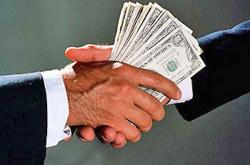
 GeekDad praise is heaped upon Eric Newman, who submitted the correct answer to this week’s puzzle in record speed and with flawless execution. If only true genius were worth more. Solution after the jump.
GeekDad praise is heaped upon Eric Newman, who submitted the correct answer to this week’s puzzle in record speed and with flawless execution. If only true genius were worth more. Solution after the jump.
So, there is obviously some disagreement as to the success of last week’s extra-solar mapping assignment. After some heated discussion, the investors agree to pay you some small portion of your agreed fee, but you will have to guess the amount. You don’t know how large the number is, but you happen to know with certainty that it is less than
$9,200.
You deduce that a few questions should be enough to derive the answer. You also know that your investors are in the habit of making statements that are alternatively true and false and, unfortunately you have been misinformed about the truthfulness of the last statement made by the investors that immediately preceded your questions. You write down three questions to which you ask the investors to write down answers "Yes" or "No":
1. Is the number a perfect square?
2. Is it a multiple of 19?
3. Is it the product of five different primes (excluding 1)?
After reading what the investors have written and after a moment of thought you have no reason to change your views about which answers are true and which are false. You say: "If I knew that there was at least one zero in it I could tell you the number." You are told, truthfully, that there is not a zero in it. What is the amount you will be paid?
SOLUTION
There are eight possible combinations for the answers to the three questions as follows (# = not):
1. sqr, /19, *5′
2. sqr, /19, #*5′
3. sqr, #/19, *5′
4. sqr, #/19, #*5′
5. #sqr, /19, *5′
6. #sqr, /19, #*5′
7. #sqr, #/19, 5′
8. #sqr, #/19, #*5′
It is not possible for a number to be a square and the product of five prime numbers so options 1 and 3 are eliminated. Even if you thought this you would have "reason to change your mind about which answers are true and which are false."
Options 4, 5, 6, 7, and 8 all contain numerous possibilities (some very numerous). Only options 2 and 5 have numbers that would allow you to guess correctly if you knew the number had a zero. Only one number fits the criteria and has a zero in option 2 (9,025 [95^2]). Option 5 (15,015 [3x5x7x11x13]) is too large. Plus, you are told truthfully that the answer does not contain a zero and thus are wrong about the truthfulness sequence in all of your questions so option 2 is out.
If the answer does not contain a zero, then the only option left is 7. Only one product of five primes is small enough and does not contain a zero (2x3x7x11x17). Your genius merits a measly $7,854.

